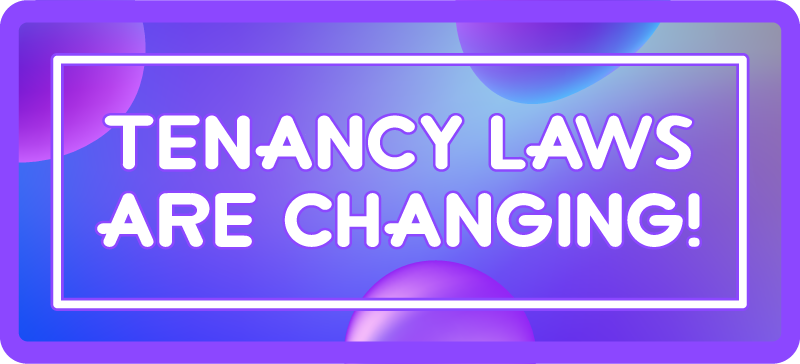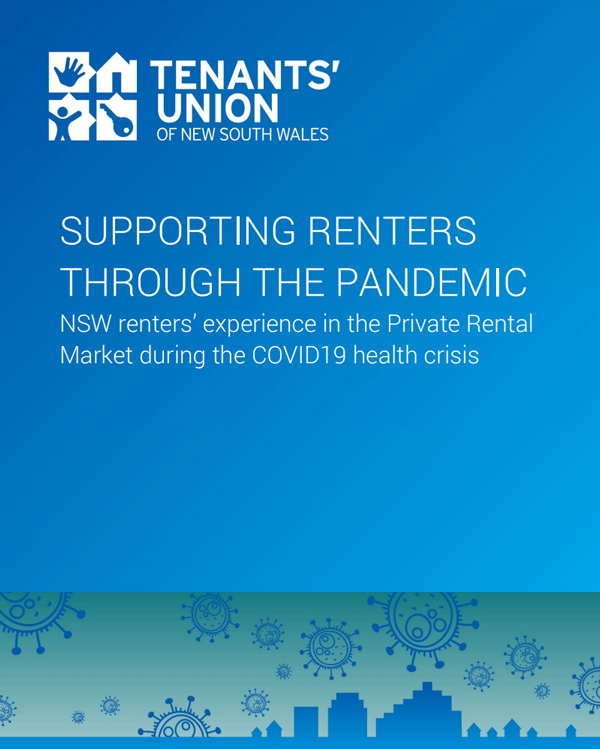Report: Supporting Renters Through the Pandemic
02/09/2020
Supporting Renters Through the Pandemic: NSW renters’ experience in the Private Rental Market during the COVID19 health crisis
The COVID-19 crisis has affected everyone in our community. Renting households have been particularly vulnerable during this time, with many renters working in sectors hard hit by the pandemic such as retail, hospitality, tourism, and the tertiary education sector.
There has been significant disruption within private rental markets, principally due to the financial hardship being experienced by tenants and landlords. In anticipation of this, in early April the NSW Government implemented measures including:
- An initial 60 day stop on landlords evicting impacted tenants for rentalarrears. This was in effect from 14 April 2020 to 13 June 2020
- A six month restriction on landlords evicting impacted tenants for rent arrears, limiting them to where formal rent reduction negotiations between landlord and tenant have failed and the NSW Civil and Administrative Tribunal (NCAT) decides it is ‘fair and reasonable’ to evict in the specific circumstances of the case
- Allowing impacted tenants to terminate a tenancy agreement where a landlord will not negotiate or where termination is necessary to avoid financial hardship
- Restricting use of tenancy databases under certain circumstances to protect impacted tenants from effective ‘blacklisting’
These moratorium protections apply primarily for renters who have lost 25% or more in their weekly household income due to COVID-19 and are struggling to meet their rent payments (‘impacted tenants’).
A number of other measures were implemented to support renters including the extension of notice periods for some other evictions; additional resourcing of Fair Trading and NCAT to assist in mediation and dispute resolution between landlords and tenants; a one off funding boost for tenant advocacy services to deal with expected increase in service demand; and a rent assistance package that closed for applications at the end of June. In addition, land tax relief of up to 25% is being provided to landlords who pass on this discount as a rent reduction (waiver) to impacted tenants.
Purpose of the Report
In this report we consider the impacts of COVID-19 on NSW renting households, and assess the effectiveness of the NSW Eviction Moratorium protections using the limited data currently available. While the report touches on the effect of COVID-19 for residents in public and community housing, the focus is primarily on the experience of renters in the private rental market. The report considers a wide range of issues that have arisen for these renters, including:
- The effectiveness of the rent reduction negotiation process in NSW.
- Renters’ experience of eviction during the pandemic including use of ‘no grounds’ evictions by landlords to evade moratorium measures.
- Renters’ accumulation of debt and ending tenancies due to financial hardship
- Gaps in the framework including the experience of renters in share accommodation, temporary visa holders, and renters in bushfire affected areas during the pandemic.
This report provides evidence of the continued need for support for renting households across NSW during the pandemic and demonstrates the need for an extension and strengthening of moratorium protections. The report also recommends the introduction of a targeted financial assistance scheme.
The COVID-19 health crisis has reminded us all of the importance of access to secure, affordable housing for good health. If protections and supports are ended prematurely many people who rent will be forced further into financial hardship. Many will experience the significant stress and costs of moving or may even face homelessness. ‘Home’ should be a shelter and safe refuge. The need for everyone to have access to a safe, secure, affordable ‘home’ has been thrown into sharp relief as the crisis has made clear the significant role housing plays as a public health and safety measure, and the significant challenges posed for individuals – and communities – when housing is insecure.


